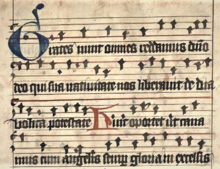Grates nunc omnes

Grates nunc omnes are the initial Latin words in the sequence of midnight mass at Christmas .
history
The sequence dates from the 11th century and is first documented in a Regensburg tropar from 1030. It is composed in the eighth church tone and is still included in the chorale book from 1527 printed by Lucantonio Giunta's printing works in Venice . However, it is one of the multitude of sequences that have no longer been part of the official Roman Catholic liturgy since the reform of the Council of Trent in the mid-16th century .
The sequence was also used for communion and processional chant. In the 14th century, the custom developed to combine it responsibly with a German stanza ( Leise ). The Quiet Lovet sistu Ihesu Crist is the first time in a Middle Low German manuscript of 1380 from the Cistercian - Kloster Medingen occupied. From this counterfacture , Martin Luther created the Christmas carol Praised be you, Jesu Christ ( EG 23, GL 252) with the addition of six further stanzas .
Text and translations
| Latin | translation
|
transmission
|
|---|---|---|
|
|
|
literature
- Hansjakob Becker et al. (Ed.): Geistliches Wunderhorn. Great German hymns. CH Beck, Munich 2001, ISBN 3-406-48094-2 , pp. 69-75.
Web links
- full text of Praise be, Jesus Christ
- Michael Fischer: Praise be to you, Jesus Christ (2007). In: Popular and Traditional Songs. Historical-critical song lexicon of the German Folk Song Archive
Individual evidence
- ↑ a b c Grates nunc omnes , in: On Contrafactures of Gregorian Repertoire , December 2018, accessed on December 17, 2018
- ^ Walther Lipphardt: Two newly found nuns' prayer books from the Lüneburg Heath as a source of Low German hymns from the Middle Ages . In: Jahrbuch für Liturgik und Hymnologie , Jg. 14 (1969), pp. 123-129, here p. 127 ( JSTOR 24193532 ).